Cristofano Bronzino

Cristoforo Bronzini was born around 1580 in Sirolo, in the province of Ancona. From a wealthy family, he had the opportunity to cultivate his interests and continue his studies first in Ancora and then in Rome. Bronzini's pleasant character favored his access to Roman ecclesiastical circles.
The main biographical information can be found in the work of Gian Vittorio Rossi,[1] (1570-1647), in his Pinachoteca Tertia (1648), in which he refers to his friendship with Cardinal Evangelista Pallotta, whose advisor and Caudatario he became. The relationship with the latter turns out to be particularly important for the life of the young writer from Marche, as it allows him to get closer to the Roman cultural milieu. He is credited with great dialectical qualities, an extraordinary intelligence and good memory skills. Thanks to these characteristics he attracted the attention of the Medici court: in 1615 he moved to Florence, becoming adviser to Cardinal Carlo de' Medici and distinguishing himself as master of ceremonies. He spent the last years of his life in the Tuscan city where he died around 1640. In 1618 he began his literary project, the dialogue Della dignità e della libertà delle donne (Of the Dignity and Liberty of Women). The twenty-four parts of the initial project included four weeks, each consisting of six days. However, the publication of the work to date is incomplete: between 1618 and 1625 the six days of the first week appeared, and between 1628 and 1632, the first two days of the second week, called Day Eight and Day Ninth. The first edition of the dialogue was ascribed in the 1622 Index of Forbidden Books, then republished in 1624.

 +34 954 610 124
+34 954 610 124






